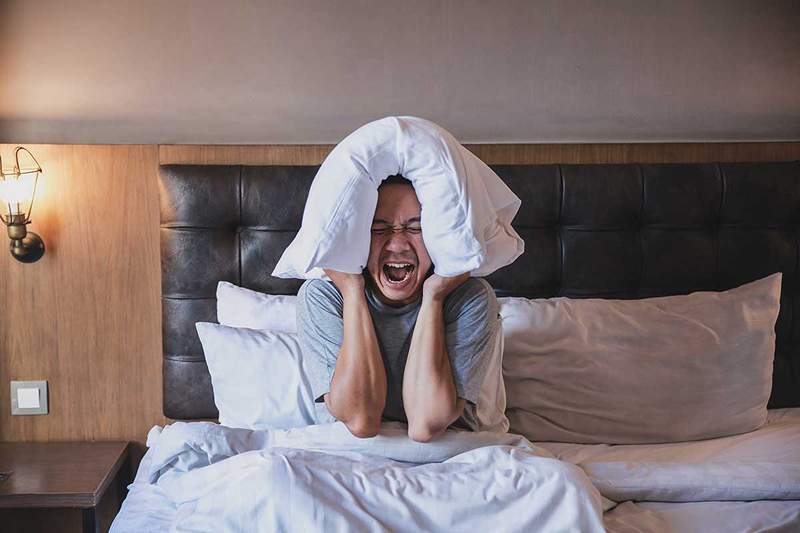Somnifobia, the fear of sleeping

- 2004
- 73
- Glen Vandervort Sr.
Somnifobia implies fear in excess to reconcile sleep. Those who suffer from it suffer from palpitations, sweating, panic attacks and irrational fear just thinking about sleeping.
Resting correctly is fundamental to develop our life normally. During sleep we recover energy for the day and allows us to perform correctly. Our brain and physical activity depends on the correct rest.
In this article we will tell you about Somnifobia, its gravity and main symptoms, highlighting the importance of sleeping well for our health. If you want to know what this strange phobia is about and how to detect it to overcome it, then keep reading.
Content
Toggle- What is known as Somnifobia?
- The importance of sleeping
- Identify Somnifobia
- Main symptoms of somnifobia
- Possible causes
- Treat Somnifobia to live better
- Resources
What is known as Somnifobia?
Somnifobia is the name that is awarded to suffer fear of sleeping.
It generates anxiety, extreme terror in people who suffer just thinking of reconciling sleep. Like the rest of the phobias, the fear of sleep is considered a disorder at the time when everyday life is difficult because of it.
Those who suffer from somnifobia, are notably anguish as the time they should go to sleep, or just think that they should do so soon. In general, it is not about fearing being asleep specifically, but These people are usually paralyzed by what they believe can happen while they sleep.
Normally, people with somnifobia Fear, sleep, forget about breathing or not being able to wake up Because of a sudden death during sleep. It is not about real or objective threats, but they are feared to a large extent.
The importance of sleeping
Sleeping is essential for our health. That, at least in broad strokes, we all know. When we sleep, our body and brain recover after the activity of the day. During the dream we "recharge energy", rest is the necessary impulse to start the next day with vitality.
After a pleasant night, our brain and rested body will bring us great advantages. We can think clearly, concentrate, be alert, we will have enough energy to perform physical activity and our humor will improve, so we will keep a kind treatment of the rest of the people. However, beyond its multiple benefits, Not resting correctly brings serious consequences.
How long can a sleeping person spend?
Not to sleep well, probably Increase our blood pressure, the possibility of contracting heart disease and strokes will increase. In addition, we will feel irritated, anxious and in some people it helps to get depression.
As you will see, sleep is crucial for our well -being. That is why the cases of somnifobia must be identified, diagnosed and treated. Only in this way will it be possible to recover good health lost.
 What is the anxious ambivalent attachment
What is the anxious ambivalent attachment Identify Somnifobia
As we have advanced, identifying that someone presents sleep disorders is the first step to achieve, in case it is a case of somnifobia, reach a diagnosis. Treating this condition is the only way to recover a normal rhythm of life and feel better.
We will tell you how are the main symptoms and causes of somnifobia, so that you can be alert and identify both in yourself and other people who know.
Main symptoms of somnifobia
Somnifobia stands out for a series of typical symptoms. Although not necessarily all appear in each particular case, we will list what are the most common symptoms that occur in those people who feel panic when thinking about reconciling the dream:
- Suffer from panic attacks when bedtime.
- That thinking about sleeping generates fear and anxiety.
- Do everything within your reach, how to put excuses, to avoid sleeping.
- Concentration problems, lack of memory.
- Sudden humor changes.
- Decrease in physical performance due to fatigue.
- Tachycardia and stomach problems due to stress suffered. Also sweating and hyperventilation.
As you can see, the symptoms related to somnifobia are simple to identify and high gravity. People suffering from this kind of phobia, actually Do not fear the dream itself, but what could happen while they sleep, How to drown, stop breathing, something happens to the people with whom they live and not notice, or even feel fear of failing to wake up.
Possible causes
The reasons why somnifobia can be developed are unknown. However, there are some conditions or experiences that specialists have associated with it.
Traumatic experiences such as serious accidents, having suffered or suffering from abuse, even the death of a loved one can lead to contracting somnifobia. Also somnifobia or fear of sleeping can be a sign, being a symptom of another condition that is behind it, such as depression, anxiety, schizophrenia and bipolarity.
It is not always possible to determine why someone suffers from this disorder, nor in all cases where any of the related causes are given. However, it is important to keep in mind the possible causes that can trigger it to be able to consider it.
Treat Somnifobia to live better
At this point they will already know, Somnifobia is one inside the existing phobias. It implies irrational fear of reconciling sleep and entails serious consequences both physically and cerebrally.
Like every phobia, sleepwalking must be treated with a psychotherapist. In therapy, according to the particularities of the case, the professional will know what strategies implement in order to overcome panic and return well -being to the patient.
Sleeping is essential to cross our day to day in good condition and normally. If you think you suffer from somnifobia or you think that someone you know can suffer from it, use a professional. He or she will know how to identify the case and evaluate, if necessary, what treatment could correspond. The treatment for phobia is the only way to recover well -being and live better.
Phobias and panic attacks, what is its mechanism?
Resources
- Contreras, s. TO. (2013). Sleep throughout life and its implications in health. Las Condes Clinical Medical Magazine, 24 (3), 341-349.
- Crystal Raypole. (2019). Understanding Somniphobia, Or Fear of Sleep. Healthline. Recovered from: https: // www.Healthline.com/health/somniphobia
- Rowe, e. SOMNIPHOBIA: WHEN SLEEP IS SCARY.

